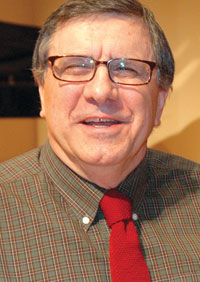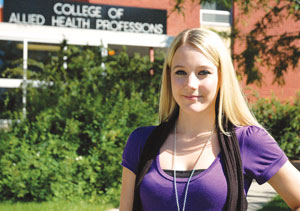University Communications and Marketing
Quiet man with major student impact
July 6, 2009
Contacts:
Dan Carter, University Relations, 657-2269
A reserved professional, Dr. Terry Blackwell has hurricane-force influence College of Allied Health Professions and its graduate students

MSU BILLINGS NEWS SERVICES — Spend any time among College of Allied Health Professions faculty at Montana State University Billings and you’ll hear a familiar saying: The only good thing to come out of Hurricane Katrina is Terry Blackwell.
The devastation from the August 2005 hurricane left Blackwell, a rehabilitation counseling educator, without a place to live and work in New Orleans. He found his way to Montana and in his own quiet way, has taken MSU Billings and its students by storm.
A professor and chair in the Department of Rehabilitation and Human Services, Blackwell has distinguished himself a visionary educator and a strong researcher. He helped move a free community mental health counseling clinic from a proposal to a reality in 2006 and in 2009 was named a Rehabilitation Researcher of the Year by the National Council on Rehabilitation Education.
But he is becoming just as well known as his role as a research collaborator with his graduate students.
The most recent issue of the peer-reviewed Journal of Applied Rehabilitation Counseling features an article published by three PhD-level professionals and one graduate student. The graduate student and one of the professionals — Blackwell —are from MSU Billings.
For Blackwell, it’s all a part of the natural progression of education. Students learn, they study and they practice what they learn.
“This is an exciting part of the program,” Blackwell said. “Students have the opportunity to contribute to their field.”

Ashley Waldmann is the graduate student whose name appears on the professional journal
with her professor and mentor. She said while she came to MSU Billings for experience
in the counseling clinic, the research and publishing work was a bonus.
“It was such a good experience,” said Waldmann, a 24-year-old Billings resident. “Being a part of that was nothing I really thought about, frankly.”
After she graduated from Billings Skyview in 2003, Waldmann attended MSU Billings for a year before transferring to MSU in Bozeman to get her psychology degree. She returned Billings for graduate school because she wanted to get some real-life education and experience in the counseling field.
“One of the biggest things that drew me here was the counseling clinic,” she said. “I like that hands-on experience. You can’t really know how to counsel someone unless you do it hands on.”
Confident and outgoing, Waldmann connected with Blackwell, who has been working with Dr. Kyle Colling and Dr. Barbara Harrold on operating free community counseling clinic at the university. The clinic opened in November 2007 and provides free, short-term problem-solving counseling services to Billings residents who otherwise could not access services. The appointment-only clinic operates out of the ground level of the College of Education building and services are provided by graduate students.
Blackwell approached Waldmann about being a part of a research project that would discuss special issues relating to rehabilitation counselor ethics in disaster situations. The work would be done by Dr. Jan Case, at the Louisiana State University Health Sciences Center and Dr. Mary Barros-Bailey, a bilingual rehabilitation counselor and vocational expert in Boise Idaho.
Saying the work was intimidating at first, Waldmann jumped into the project. Their work, outlining how provision of services in times of disaster may force counselors to reassess their practices with respect to certain professional ethical principles, carries her name on the journal article.
“It was a great experience,” she said. “I got to write it and also present it in ethics courses.”
Dr. Diane Duin, interim dean at the College of Allied Health Professions, said Blackwell constantly finds ways to involve students in his work.
“He is really in tune with students and interested in getting them experience,” she said. “It’s not about Terry. It’s always about students and getting them involved.”
Blackwell has a history of collaboration. The research work for which he was honored this year was done with colleagues Dr. Stephen J. Leierer and Dr. Douglas C. Strohmer and noted in “The Newly Revised Strong Interest Inventory: A Profile Interpretation for Rehabilitation Counselors.”
Blackwell said the research was focused on finding a way to better determine potential success and satisfaction of rehabilitation counselors based on interest inventories. There is increased need for that information, he said, because of long-term and increasing demand for rehabilitation counselors.
Rehabilitation counselor profiles draw heavily on people skills, verbal abilities, the ability to listen and understand and a preference for settings that allow for the expression of creativity, the researchers reported. Using aggregate scores from 281 female and 133 male rehabilitation counselors, the researchers developed prototypical Strong Interest Inventory profiles. These results can help explain the interests, work activities, potential skills and values of rehabilitation counselors, they said.
Blackwell said this is the first time that rehabilitation counseling has had an occupation scale from which to work and assess their profession.
“It gives us more visibility and awareness,” he said.
Essentially a landmark, he only takes a minimal amount of credit, which doesn’t surprise people like Duin.
“He does things quietly, but he makes things seem effortless,” she said.
